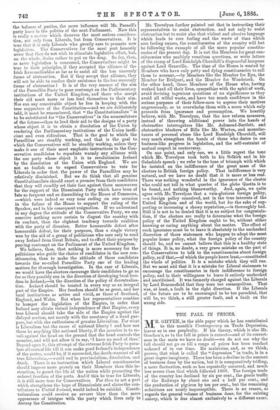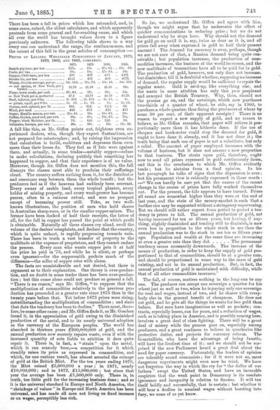THE FALL IN PRICES.
MR. GIFFEN, in the able paper which he has contributed to this month's Contemporary on Trade Depression, leaves us in one perplexity. If his theory, which is also Mr. Goschen's, as to the fall in prices is correct—and of its correctness in the main we have no doubt—we do not see why the fall should not go on till a range of prices has been reached unheard of in our time. He maintains, and, as we think, proves, that what is called the " depression " in trade, is in a great degree imaginary. There has been a decline in the amount of business done by the nation, but it is comparatively trifling, a mere fluctuation, such as has repeatedly occurred, and much less severe than that which followed 1866. The foreign trade of the country has declined by six per cent., the goods traffic of the Railways by about one and a half per cent., and the production. of pig-iron by ten per cent., but the remaining reductions are nearly imperceptible. There is no reason, as regards the general volume of business done, for the existing outcry, which is due almost exclusively to a different 031153. There has been a fall in prices which has astounded, and, in some cases, ruined, the oldest calculators, and which apparently proceeds from some general and far-reaching cause, and which all over the world has brought values down to a figure previously unknown. The following table shows in a way every one can understand the range, the continuousness, and the extent of this fall in the great articles of consumption : PRICES OF LEADING WHOLESALE COMMODITIES IN JANUARY, 1873, 1879, 1883, AND 1885, COMPARED.
A fall like this, as Mr. Giffen points out, frightens even experienced dealers, who, though they expect fluctuations, are not prepared for catastrophes ; and, by raising the impression that calculation is futile, embitters and depresses them even more than their losses do. They feel as if fate were against them, and actually, in some trades-notably copper-refuse to make calculations, declaring publicly that something has happened to copper, and that their experience is of no value. Moreover, though Mr. Giffen does not mention this, the fall dismays the classes most able to proclaim their sufferings aloud. The country suffers nothing from it, for the distributor and consumer reap between them the whole benefit ; but the producers feel as if the heavens had suddenly been overcast. Every owner of arable land, every tropical planter, every holder of mining property, and every wool-grower has become poorer, often to a ruinous extent, and sees no prospect except of becoming poorer still. Take, as two wellknown illustrations, the position of men who hold shares in Australian sheep-runs, or in the smaller copper-mines. The former have been docked of half their receipts, the latter of all, for the fall in copper has passed the point at which profit is obtainable. Naturally all these classes cry aloud, swell the volume of the dealers' complaints, and declare that the country, which is quite unhurt, is rapidly progressing towards ruin. There has been in truth a vast transfer of property to the multitude at the expense of proprietors, and they cannot endure the process. Every man who wants copper gets it at half the price he paid in '73, and while he is silent, or perhaps even ignorant-for the coppersmith pockets much of the difference-the seller of copper cries with alarm.
The facts are unmistakeable and not denied, but there is argument as to their explanation. One theory is over-production, and no doubt in some trades there has been over-production; but this cause alone could not produce so general a fall. "There is no reason," says Mr. Giffen, "to suppose that the multiplication of commodities relatively to the previous production has proceeded at a greater rate since 1873 than in the twenty years before that. Yet before 1873 prices were rising, notwithstanding the multiplication of commodities ; and since that date the tendency has been to decline." There must, therefore, be some other cause ; and Mr. Giffen finds it, as Mr. Goschen found it, in the appreciation of gold owing to the diminished production of the metal, and to its nearly universal adoption as the currency of the European peoples. The world has absorbed in thirteen years £200,000,000 of gold, and the annual production now scarcely repairs waste, even if with the increased quantity of coin liable to attrition it does quite repair it. There is, in fact, a " strain " upon the metal, which it can scarcely bear,-a competition for it which steadily raises its price as expressed in commodities, and which, for one curious result, has almost arrested the coinage of gold at the British Mint. For the ten years ending 1870, the Mint coined £5,000,000 a year ; in 1871, nearly £10,000,000; and in 1872, E15,000,000 ; but since that year the average has been £1,500,000 only. There is, in truth, too little gold for the increasing business done; and as it is the universal standard in Europe and North America, the shrinkage of values" in Europe and North America has been universal, and has made all men not living on fixed incomes or on wages, perceptibly less rich. So far, we understand Mr. Giffen and agree with him, though we might argue that he underrates the effect of quicker communications in reducing price ; but we do not understand why he stops here. Why should not the demand for gold go on until it is, say, twice as dear as it is, and all prices fall away when expressed in gold to half their present amount? The demand for currency is over, perhaps, though we are not sure of that, a Russian demand being quite conceivable; but population increases, the production of commodities increases, the business of the world increases, and the new multitude of transactions have all to be paid for in gold. The production of gold, however, not only does not increase, but diminishes, till it is doubtful whether, supposing no increase of demand, the regular supply would be sufficient to repair the regular waste. Gold is used-up, like everything else, and the waste in mere attrition has only this year perplexed and annoyed the British Treasury. Why, then, should not the process go on, and the sovereign, which now purnhases two-thirds of a quarter of wheat, be able, say in 1900, to purchase a whole quarter, thus fining the producers of wheat by some 30 per cent. of their apparent receipts ? There is no reason to expect a new supply of gold, and no reason to believe, as Mr. Giffen remarks, that paper will relieve it proportionally more than it has hitherto done. If the use of cheques and bank-notes could stop the demand for gold, it ought to have done it already, and it has not done it ; the truth being that such use of paper is not a substitute, but only a relief. The amount of paper employed increases with the volume of business, but it does not assume a new proportion to that business. The strain upon gold, therefore, ought now to send all prices expressed in gold continuously down, and this is the conclusion to which Mr. Giffen evidently tends ; but he abstains from a final opinion. In his last paragraph he talks of signs that the depression is over ; but his permanent view is evidently expressed in these words : -" We can hardly be sure yet that the causes of the recent change in the course of prices have fully worked themselves out. For the present, the tide appears to have turned. Prices all round are somewhat higher than they were at the end of last year, and the state of the money-market is such that a further rise may be supported without a stringency supervening. But we should still rather expect from period to period a tendency in prices to fall. The annual production of gold, not having increased for ten or fifteen years, but having, if anything, slightly diminished and tending still to diminish, is now even less in proportion to the whole stock in use than the annual production was to the stock in use ten or fifteen years ago. Population and wealth at the same time are increasing at even a greater rate than they did The permanent tendency seems necessarily downwards. The increase of the means of production, in order to keep the supply of gold proportioned to that of commodities, should be at a greater rate, and should be proportioned in some way to the mass of gold existing, and not to its annual production. But, in fact, the annual production of gold is maintained with difficulty, while that of all other commodities increases."
The fall, of course, matters nothing in the long-run to ant' one. The producer can accept one sovereign a quarter for his wheat just as well as two, when he is paying only one sovereign for rent and wages, instead of two, and he shares with everybody else in the general benefit of cheapness. He does not eat gold, and he gets all the things he wants for less gold than before. But men have imaginations as well as pockets ; contracts, especially leases, run for years, and a reduction of wages, such as is taking place in America, and is possibly coming here, involves a great deal of class fighting. There will be a great deal of misery while the process goes on, especially among producers, and a great readiness to believe in quackeries like protective duties, and projects for currency reform. The bi-metallists, who have the advantage of being fanatic, will have the liveliest time of it ; and we should not be surprised if the new Parliament heard a great deal about the need for paper currency. Fortunately, the leaders of opinion are tolerably sound economists ; for if it were not so, most dangerous experiments might even now be tried. We have not forgotten the way in which the cry for " the dollar of our fathers" swept the United States, and have an incurable suspicion that the weak point in Democracy is its resolute ignorance and incapacity in relation to finance. It will tea itself boldly and successfully, that is certain ; but whether it will bear a decline in nominal wages without bursting into fury, we none of us yet know.



































 Previous page
Previous page